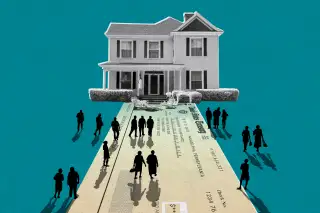Stimulus Checks Are Still Boosting First-Time Homebuyers' Down Payments

Government stimulus checks are helping people realize the dream of buying their first homes.
A recent report from Redfin found that nearly one in four first-time homebuyers are using stimulus money from the government to help put together a down payment.
The data comes from a December survey of 1,500 U.S. residents. Of the 215 respondents who indicated that they planned to buy their first home within the next year, 24% said they had saved stimulus money to help accumulate a down payment.
The most popular source of down payment money was also the most traditional: 52% of respondents said they saved money directly from their paychecks.
Others said they had been able to save extra money during the pandemic (24%), or their down payment came at least partly from working a second job (22%) or using an inheritance (17%). Some even said they got a boost from the cryptocurrency markets: 12% of respondents reported that proceeds from the sale of crypto investments helped with their down payments.
Stimulus checks helped boost Americans’ savings
In a statement accompanying the survey, Redfin Chief Economist Daryl Fairweather said that despite the economic upheaval in the early days of the pandemic, “plenty of Americans, particularly those who are in a position to buy a home, are now in a better financial position than before.” That’s partly because “stimulus payments provided a lot of Americans not only with necessary relief, but extra money in their pockets,” she added.
Since the beginning of the coronavirus pandemic, the federal government has approved three separate rounds of stimulus payments in the amounts up to $1,200, $600 and $1,400. Additional aid money was also sent out to parents in the form of advance payments of a significantly expanded child tax credit.
Experts widely credit that emergency cash with helping to keep many American families afloat during the worst of the economic crisis. One study from the University of Michigan found that financial instability — measured by the share of adults with children in U.S. Census data who said it had been very difficult to pay for household expenses over the last week — fell by 43% between December 2020 and April 2021.
While most Americans spent the first round of payments on essentials like food and rent, according to an analysis by the Peter G. Peterson Foundation, households were more likely to save portions of the subsequent rounds.
Of course, some experts have argued that all that federal stimulus money has also contributed to inflation, which has soared 7% on a year-over-year basis and helped drive up prices of everything from groceries to gasoline — not to mention rent and home prices.
More from Money:
Where's the Next Hot Place in Real Estate? Here Are 20 Contenders